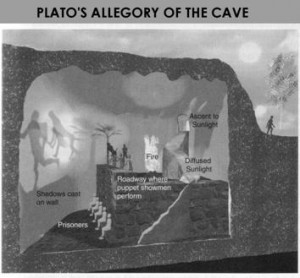Plato was was a Classical Greek philosopher, mathematician, writer of philosophical dialogues, and founder of the Academy in Athens, the first institution of higher learning in the Western world. I was recently pointed to a work of his called the Allegory of the Cave. This writing of Plato’s originally appeared in his work titled The Republic and discusses our view of reality as seen through ‘shadows’ vs. ‘real form”:
Plato imagines a group of people who have lived chained in a cave all of their lives, facing a blank wall. The people watch shadows projected on the wall by things passing in front of a fire behind them, and begin to ascribe forms to these shadows. According to Plato, the shadows are as close as the prisoners get to seeing reality. He then explains how the philosopher is like a prisoner who is freed from the cave and comes to understand that the shadows on the wall are not constitutive of reality at all, as he can perceive the true form of reality rather than the mere shadows seen by the prisoners.
 I believe this allegory has modern-day application to the work we as Internet researchers and sourcers do, and indeed, to the way we actually do our jobs. Its original intent was political in nature, desiring to shed some light (no pun intended) on justice and truth, and to show how people’s perception of truth was widely varied based on what limited information they may have been exposed to. But this thought process I believe can be applied to our approach to sourcing, especially given our affinity to stay firmly loyal to a certain set of resources or methods of research.
I believe this allegory has modern-day application to the work we as Internet researchers and sourcers do, and indeed, to the way we actually do our jobs. Its original intent was political in nature, desiring to shed some light (no pun intended) on justice and truth, and to show how people’s perception of truth was widely varied based on what limited information they may have been exposed to. But this thought process I believe can be applied to our approach to sourcing, especially given our affinity to stay firmly loyal to a certain set of resources or methods of research.
The ‘shadows’ of our work, i.e. the research we conduct either over the phone or online, are a small snapshot of the reality of who those people really are. I’m not saying that we as sourcers are actually philosophers chained up in caves (our cubicles??) looking at shadows of potential candidates being projected across our computer screens. But what I’m saying is that our perception of these people, and the resources we use, can be distorted because we’re not seeing the whole picture. We see what individuals themselves have put out there online or what they have projected in the moment in a phone conversation. With resources, we see a new way of performing an old trick, a faster way to do tedious work, or a distortion that there is simply nothing better than the old way of doing things.
As what often happens with shadows, things can be distorted by proximity to the light source, or by the light source itself. Objects farther away from the ‘fire’ might look larger than they really are, and shapes and people might be distorted based on what they’re carrying and where on their person they are carrying it. As such, how we perceive potential leads can be distorted based on how we find them, where we find them, and our own preconceived notions based on similar resources we may have used in the past. And how we view resources can be distorted based on our own personal biases based on the shadows we’ve already been exposed to.
Plato continues to discuss a ‘return to the cave’ after the prisoners are freed and shown reality, brought out of the cave, and introduced to the true source of light – the sun. This return could be good or bad. The bad would be returning to the cave and returning to old ways – what’s comfortable and familiar, ‘the way it’s always been done’, and with some bitterness and resentment to those who ‘freed’ the prisoner and showed them the way out. The good would be returning to the cave with open eyes and open mind, desiring to understand the new reality, and wanting to bring others out of the cave to expose them to a new reality, realizing that not everyone will want the new reality.
How does this apply to sourcing? I believe we are philosophers in a sense. We think deeply about our work – our job involves a healthy combination of people and technology. We desire to bring nothing but the best to our clients and our teams. Often, however, we chain ourselves up in our own caves. These caves can either be an archaic cave of the way things have always been done, or a ‘Cave of Wonders’ with all kinds of new and exciting technologies and techniques to explore.
Every once in awhile, we need to free each other from our own caves and lead each other out of captivity to see a new reality – whether that reality is a return to the basic communication and search skills it takes to be a good researcher, or whether that reality is knowing that technology is progressing and the resources out there today can actually be useful to our jobs. As prisoners, we need to remember the good intentions of our liberators, and as liberators, we need to be sensitive to the potential distress of the prisoners being exposed to something unfamiliar. Eduction is always the key.